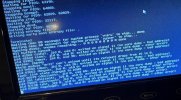I have a problem with one of my machines at home. It runs FreeBSD 14, with a few ZFS pools.
The machines boots from a single drive zroot pool (configured at install time using bsdinstall) and then a few other pools for data and fast scratch storage. When I issue
I suspect this has something to do with my zfs configuration but I'm not sure. Any clues?
The machines boots from a single drive zroot pool (configured at install time using bsdinstall) and then a few other pools for data and fast scratch storage. When I issue
reboot or shutdown -r now it looks fine at first, but then after all buffers are synced I start getting alot of errors:
Code:
Syncing disks, vnodes remaining... 0 0 0 0 0 00 done
All buffers synced.
pid 41562 (sshd), jid 0, uid 0: exited on signal 11 (no core dunmp - bad address)I suspect this has something to do with my zfs configuration but I'm not sure. Any clues?


